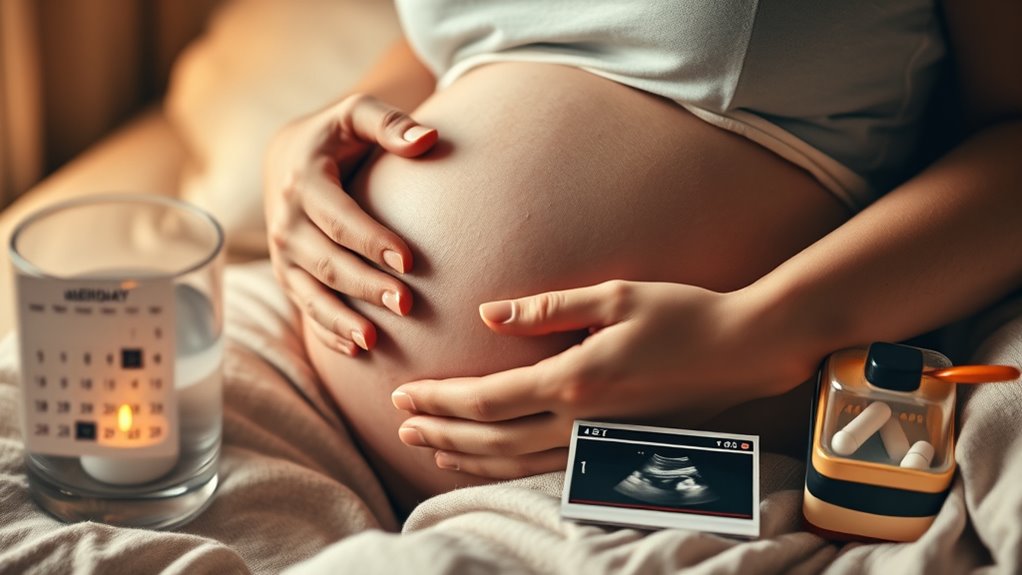In your first trimester, you’ll likely experience symptoms like morning sickness, fatigue, breast tenderness, and mood swings. To stay healthy, focus on eating well, staying hydrated, getting gentle exercise, and resting plenty. Regular checkups and key tests like blood work and ultrasounds help monitor your pregnancy’s progress. Managing these early signs and care steps sets a strong foundation for your baby’s development; more helpful tips await as you continue your journey.
Key Takeaways
- Recognize common early pregnancy symptoms like nausea, fatigue, breast tenderness, and mood swings.
- Prioritize balanced nutrition, hydration, gentle exercise, and sufficient rest for healthy development.
- Schedule regular medical checkups, including blood tests and ultrasounds, to monitor fetal and maternal health.
- Understand the importance of early screenings and tests to detect potential issues and ensure proper care.
- Consult healthcare providers before starting new routines or skincare products during the first trimester.

Nature Made Prenatal Vitamins for Women with Folic Acid + DHA, Prenatal Vitamin and Mineral Supplement for Daily Nutritional Support, 110 Softgels, 110 Day Supply
Now with orange scent: Adults take one pre natal multivitamin for women daily with water and a meal…
As an affiliate, we earn on qualifying purchases.
As an affiliate, we earn on qualifying purchases.
Recognizing Common Symptoms During the First Trimester

During the first trimester, many women experience a range of common symptoms as their bodies adjust to pregnancy. One of the most noticeable signs is morning sickness, which can cause nausea and vomiting, often at different times of the day. You might also feel extremely tired, as hormone changes ramp up your body’s energy demands. Your breasts could feel tender or swollen, signaling hormonal shifts. You may notice frequent urination or heightened sense of smell. Some women experience mood swings or mild dizziness due to fluctuating hormones. While these symptoms can be uncomfortable, they’re typical during early pregnancy. Recognizing these signs helps you understand that your body is adapting to pregnancy, and knowing what to expect can make this initial phase easier to manage.

Pearhead Sonogram Progression Frame, Pregnancy Milestone Keepsake for 1st 2nd & 3rd Trimester Ultrasound Photos, Gender-Neutral Nursery Décor, White
CAPTURE EVERY TRIMESTER MILESTONE: Celebrate your pregnancy journey from start to finish by displaying ultrasound photos from the…
As an affiliate, we earn on qualifying purchases.
As an affiliate, we earn on qualifying purchases.
Essential Care Tips for a Healthy Early Pregnancy

To support a healthy early pregnancy, you should prioritize proper nutrition, rest, and regular medical care. Focus on prenatal nutrition by eating a balanced diet rich in vitamins, minerals, and folic acid, which promotes fetal development. Stay hydrated and avoid foods that could pose risks. Incorporate gentle exercise, but always emphasize exercise safety—consult your healthcare provider before starting any new activity. Rest is vital; listen to your body and get enough sleep to help your body recover and support your baby’s growth. Avoid stress and practice relaxation techniques. Regular checkups guarantee you stay on top of your health and catch any potential issues early. By following these essential care tips, you set a strong foundation for a healthy pregnancy.

Traditional Medicinals Organic, Morning Ease Lozenges, Lemon Ginger – Supports Pregnancy Nausea Relief & Morning Sickness Associated with Normal Pregnancy – 30 Individually Wrapped Lozenges
Herbal nausea relief: Morning Ease ginger lozenges are intended to provide relief from normal morning sickness and nausea…
As an affiliate, we earn on qualifying purchases.
As an affiliate, we earn on qualifying purchases.
Important Medical Checkups and Tests in the First Trimester

Early medical checkups and tests are essential for guaranteeing a healthy pregnancy from the start. During your first trimester, your healthcare provider will recommend several key tests.
Early checkups and tests are vital for ensuring a healthy pregnancy from the beginning.
- A blood test to check your overall health, detect anemia, and confirm your blood type, which influences your prenatal vitamins. Understanding your blood type can also be important for future transfusions or complications.
- An ultrasound scan to confirm your pregnancy, estimate your due date, and check for any early concerns. These scans also help assess the development of your pregnancy and identify potential issues early on.
- Genetic screening tests to identify potential risks and ensure your baby’s health. Advances in screening technology have made these tests more comprehensive and less invasive.
- Regular use of Glycolic Acid in skincare routines, when advised by your healthcare provider, can help improve skin texture and appearance during pregnancy.
These checkups help monitor your progress, provide peace of mind, and guide necessary care. Regular visits and timely tests set a solid foundation for a healthy pregnancy and a healthy baby.

Momcozy Pregnancy Pillows for Sleeping, U Shaped Full Body Maternity Pillow with Removable Cover – Support for Back, Legs, Belly, HIPS for Pregnant Women, 57 Inch Pregnancy Pillow for Women, Grey
Ergonomic Supportive Pillow – Momcozy full body pillow designs to replace the needs of multiple bed pillows, it…
As an affiliate, we earn on qualifying purchases.
As an affiliate, we earn on qualifying purchases.
Frequently Asked Questions
When Should I Start Feeling Pregnant Symptoms?
You might start feeling pregnancy symptoms anywhere from two to eight weeks after conception, though symptom timing varies widely. Common pregnancy milestones include missed periods, early fatigue, and tender breasts, which can signal pregnancy. Some women notice symptoms like nausea or mood swings early on, while others may not feel much until later. Remember, every pregnancy is different, so don’t worry if your symptoms don’t match typical timelines.
Are There Any Activities I Should Avoid During Early Pregnancy?
During early pregnancy, you should avoid strenuous exercise and heavy lifting to prevent strain, and steer clear of household hazards like cleaning chemicals and sharp objects. It’s best to stick to gentle activities like walking or prenatal yoga, but always check with your healthcare provider before making changes. Stay cautious with activities that could cause falls or injury, and prioritize rest and safe environments to protect your developing baby.
Can I Travel Safely in My First Trimester?
Yes, you can generally travel safely in your first trimester, but it’s important to contemplate pregnancy travel safety. Coincidence often brings the best adventures, but during early pregnancy, listen to your body and consult your healthcare provider. Choose comfortable, direct routes, stay hydrated, and avoid risky activities. With proper planning and care, you can enjoy travel while prioritizing your health and your baby’s well-being.
How Do I Differentiate Between Normal Symptoms and Warning Signs?
You can tell normal pregnancy symptoms from warning signs by paying attention to their severity and duration. Mild nausea, fatigue, and tender breasts are typical, but if you experience heavy bleeding, severe abdominal pain, or sudden dizziness, these could be warning signs. Trust your instincts and consult your healthcare provider if symptoms worsen or feel abnormal, ensuring both your safety and your baby’s health.
What Are the Risks of Certain Medications During Early Pregnancy?
You might think taking any medication is safe during early pregnancy, but think again. Some drugs pose serious teratogenic risks, threatening your baby’s development. Medication safety is essential; certain medications can cause birth defects or complications. Always check with your healthcare provider before taking any medication, even over-the-counter. Remember, what seems harmless could have lasting effects, making it critical to stay informed and cautious during this delicate stage.
Conclusion
As you navigate the first trimester, think of it as planting a delicate seed—you’ll nurture it with care, watch for early signs, and attend to each checkup like watering its roots. With patience and gentle attention, you’re laying the foundation for a healthy journey ahead. Embrace this special time, knowing that every symptom and appointment is a step toward blossoming into the beautiful future that’s waiting to unfold.









